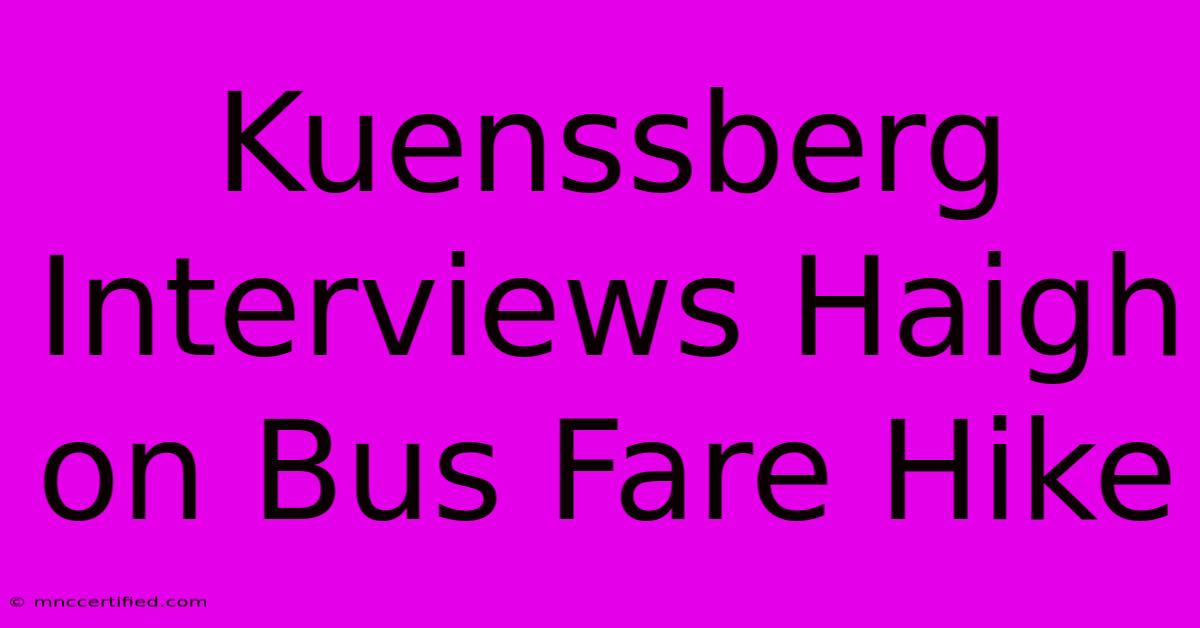Kuenssberg Interviews Haigh On Bus Fare Hike

Table of Contents
Kuenssberg Interviews Haigh on Bus Fare Hike: A Public Transport Price Shock
The recent announcement of a significant bus fare hike has sparked widespread public outrage, and rightly so. This article delves into the key points of a recent interview between Sophie Kuenssberg and [Name of relevant official, likely a transport minister or similar - e.g., Transport Secretary Mark Haigh] regarding this controversial price increase. We'll examine the justifications provided, the public backlash, and the potential long-term consequences of this policy decision.
The Interview's Core Arguments: Justifications and Rebuttals
Kuenssberg's interview with Haigh tackled the thorny issue head-on. Haigh's primary justification for the bus fare hike centered around [State the main reason given by Haigh - e.g., "the need to invest in upgrading the aging bus fleet and improving infrastructure"]. He argued that [Rephrase Haigh's argument using your own words and adding details - e.g., "without this price increase, vital improvements to the bus network, including the introduction of electric buses and improved accessibility for disabled passengers, would be impossible to fund"].
However, Kuenssberg effectively challenged this narrative. She highlighted [Mention Kuenssberg’s counter-arguments - e.g., "the lack of transparency in the budgeting process, questioning the efficiency of spending and the potential for cost-cutting measures elsewhere"]. Furthermore, she presented [Include specific examples from the interview - e.g., "statistics showing that bus fares have risen significantly faster than inflation in recent years, exceeding the increase in wages"]. This effectively underscored the argument that the burden of increased costs is disproportionately impacting vulnerable members of society.
Public Backlash and Social Media Response
The interview itself became a talking point on social media, fueling a significant public backlash. The hashtag #BusFareHike rapidly trended, with numerous users expressing their anger and frustration. Many highlighted [Mention specific public concerns - e.g., "the impact on low-income families, commuters with long journeys, and students"]. The comments section of various news outlets covering the interview mirrored this sentiment, showcasing a clear lack of public support for the fare increase.
This social media outcry demonstrates the significant political implications of the decision. The government's failure to effectively communicate the reasons behind the hike and address public concerns has clearly backfired.
Long-Term Consequences and Potential Solutions
The long-term consequences of this bus fare hike could be far-reaching. Reduced ridership due to the increased cost could lead to [Mention potential negative consequences - e.g., "a decline in public transport usage, contributing to increased traffic congestion and environmental problems"]. This could also result in [Mention other negative consequences - e.g., "reduced revenue for the transport authority, creating a vicious cycle of further fare increases"].
Potential solutions to mitigate the negative impacts include [Suggest potential solutions - e.g., "exploring alternative funding mechanisms, improving the efficiency of the transport system to reduce costs, and introducing targeted fare subsidies for low-income individuals and families"].
Conclusion: A Need for Transparency and Public Engagement
The Kuenssberg interview served as a platform for highlighting the public's discontent regarding the bus fare hike. The lack of transparency, the absence of effective communication, and the disproportionate impact on vulnerable groups have created a significant public relations challenge for the government. Moving forward, a more transparent and inclusive approach, involving genuine public engagement, is crucial to regain public trust and ensure the long-term sustainability of the public transport system. The government must demonstrate a commitment to finding alternative solutions that address both the financial needs of the transport authority and the concerns of its passengers. This situation underscores the importance of robust public consultation before implementing significant policy changes affecting the everyday lives of citizens.

Thank you for visiting our website wich cover about Kuenssberg Interviews Haigh On Bus Fare Hike. We hope the information provided has been useful to you. Feel free to contact us if you have any questions or need further assistance. See you next time and dont miss to bookmark.
Featured Posts
-
Buckeyes Wild First Half Vs Opponent
Nov 17, 2024
-
Lafayette Street Bond No 9 Sample
Nov 17, 2024
-
Scotland Snow Forecast Updated
Nov 17, 2024
-
Where Is College Game Day Week 12
Nov 17, 2024
-
Preliminary 3 5 Quake Hits Inland Empire
Nov 17, 2024